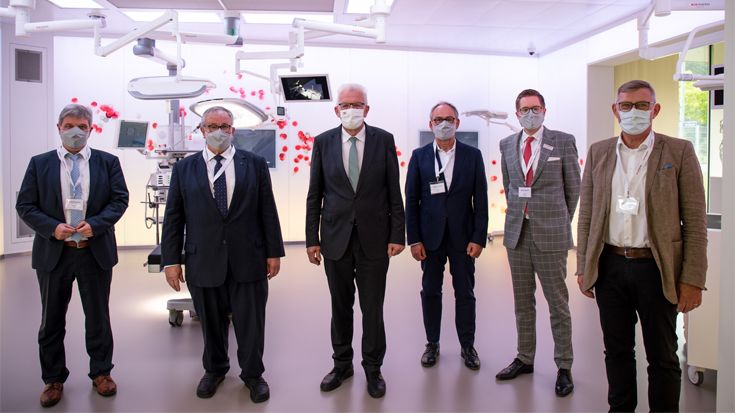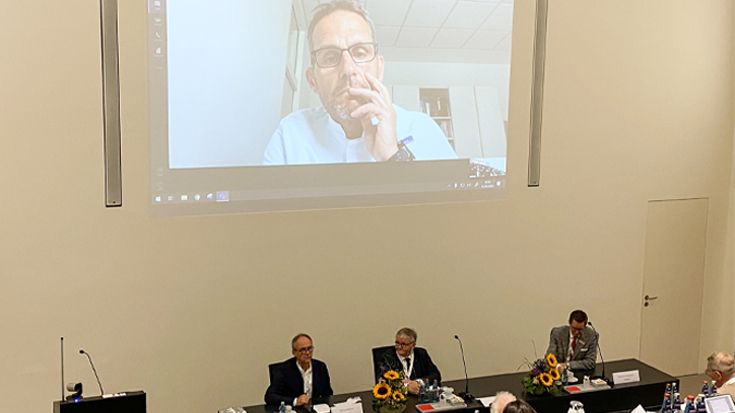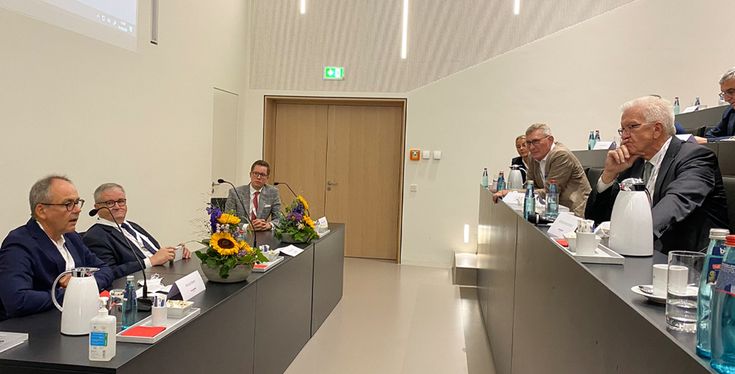
In the course of his summer tour, Baden-Württemberg's Minister President Winfried Kretschmann visited us today together with District Administrator Stefan Baer, Lord Mayor Michael Beck and representatives of the Ministry of State and Medical Mountains. Under the motto "Digitalization and Individualization in Medical Technology", the joint product development with clinical users, challenges of the European Medical Device Regulation for medicine and medium-sized companies as well as the shortage of skilled workers in rural areas were discussed.
Karl Leibinger welcomed the guests with a warm speech. Afterwards, Michael Martin guided the group of visitors through the product exhibition. Here, the focus was on our two main business fields, i.e. cranio-maxillofacial surgery and high-frequency surgery.
Our patient-specific implants are the fastest-growing product area. We are taking advantage of the opportunities offered by digitization and have developed a digital workflow around the product with the overall concept of Individual Patient Solutions. The goal behind this development was to digitize and standardize the process of individualized patient care and the ordering and manufacturing of a patient-specific implant, thus making it accessible to more patients. In 2019 alone, we were thus able to improve the quality of life of around 10,000 patients. Sebastian Steppacher, Head of Surgical Product Management Implant Systems, illustrated this digital workflow clearly using an example patient case.
To bring the user's point of view into the discussion, we started a video conference with Prof. Dr. med. Dr. med. dent. Jürgen Hoffmann, Medical Director of the Clinic and Polyclinic for Oral and Maxillofacial Surgery in Heidelberg.

Prof. Hoffmann emphasized the special and innovative character of "Swabian tinkering" in connection with the close cooperation with clinical users. "We are way ahead and are also showing internationally how surgery works today," said Prof. Hoffmann. He hopes that politicians will continue to strengthen the network between medicine and industry in the future. Only interdisciplinary teams can develop solutions that are needed in the market and therefore make the difference.

Mr. Kretschmann was particularly interested in the effects of MDR for clinical application as well as for medical technology. All in all, the participants from medical technology and medicine classified MDR and the high bureaucratic effort that goes along with it as an obstacle to innovation. Prof. Hoffmann criticized in particular the increased documentary effort for medical device manufacturers, even for standard instruments, and the high costs associated with this. Karl Leibinger and Michael Martin shared this view. "When a new product is developed, a large part of the resources flows into technical documentation, which does not always provide added value for patients. In such cases, resources could be invested more specifically in the interdisciplinary development of new products," Karl Leibinger clarified.
Finally, the lack of skilled workers in rural areas was discussed. "Our region is also attractive for skilled workers due to its proximity to Lake Constance and its strong industry. Furthermore, the well-developed university network, our own educational opportunities as well as the cooperation with Medical Mountains help us to attract skilled workers. At present, the shortage of skilled workers is therefore not yet a problem for us. But we are also aware that it will become increasingly difficult to find them in the future," Karl Leibinger summed up.
We would like to thank Mr. Kretschmann for his willingness to engage in dialogue and his interest in gaining an insight into our daily work, and our colleagues from Medical Mountains for their organization. See you next time!